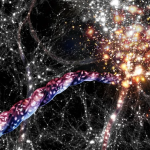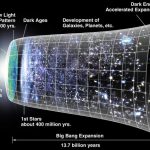Key Takeaways:
- Recent research by cosmologists suggests the universe operates as a self-learning machine through autodidactic algorithms.
- Physicists from Brown University and the Flatiron Institute, with support from Microsoft, explore the idea that the universe has experimented with various physical laws before settling on those we observe today.
- The concept of “learning” in this context extends beyond adaptation, involving theorizing, modeling, and predicting, similar to Charles Darwin’s study of specialized animal adaptations.
- The research paper defines key terms related to how the universe “learns” and introduces the idea that learning plays a crucial role in the evolution of physical laws.
- This groundbreaking research opens the door to a new field of cosmological exploration, emphasizing the potential of a learning universe to create novel phenomena, including life and the work of physicists.
A group of cosmologists has shed light on the universe’s astonishing history as a self-learning, autodidactic entity.
These scientists, hailing from prestigious institutions like Brown University and the Flatiron Institute, propose a captivating idea that the universe has diligently examined a myriad of physical laws before adopting the ones we observe today. This intriguing concept not only challenges our understanding of the universe but also hints at profound implications for future scientific exploration.
Presenting their findings in an extensive paper on the pre-print server arXiv, these researchers, backed by Microsoft’s computational and logistical support, bridge the realms of theoretical physics, computer science, and the philosophy of science. Their interdisciplinary approach underscores the monumental nature of their research.
The fundamental premise revolves around the universe’s observation of various laws of physics. The scientists contend that alternative laws of physics appear equally plausible, given the mathematical fabric of the universe. This leads to a fundamental question: why have the laws we currently observe been chosen over others?
The scientists elucidate this by redefining “learning” in the context of the universe’s functioning. They emphasize that learning transcends mere moment-to-moment adaptation and encompasses theorizing, modeling, and predicting.
They draw parallels to Charles Darwin’s work, which examined how diverse species specialized to thrive in various environments. In a similar vein, the researchers ponder why the universe adheres to a singular set of physical laws rather than adopting a multitude of specialized variations.
In their comprehensive paper, the scientists introduce an array of terms to define their understanding of “learning” within the universe. They emphasize that the universe consists of systems, each with its daily processes, nested within a complex environment composed of various systems. Their research highlights that evolution is a form of learning, indicating that natural selection plays a pivotal role in shaping the universe’s physical laws.
To address questions about consciousness and learning, the researchers distinguish between learning as a causal process conveyed by physical interactions and learning as a special phenomenon required to explain certain events. They exemplify this distinction using the phrase “You never learn” to demonstrate how visible outcomes serve as a gauge for learning.
For those eager to delve into the details, the 79-page study presents a wealth of intriguing terms and arguments. The researchers’ ultimate goal is to initiate a fresh branch of cosmological exploration, centered on the notion of a learning universe.
Furthermore, they propose that a universe capable of evolving its laws may give rise to novel phenomena such as life and inspire physicists to explore new frontiers in their field.


